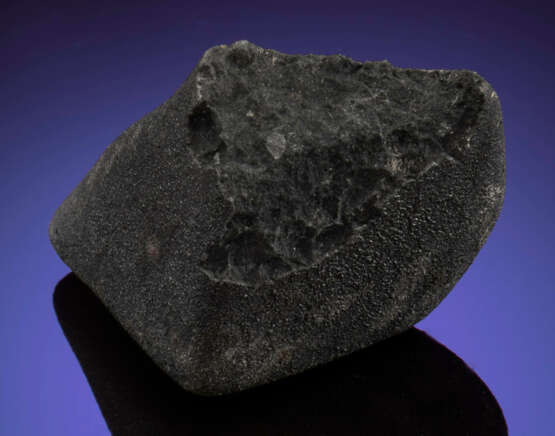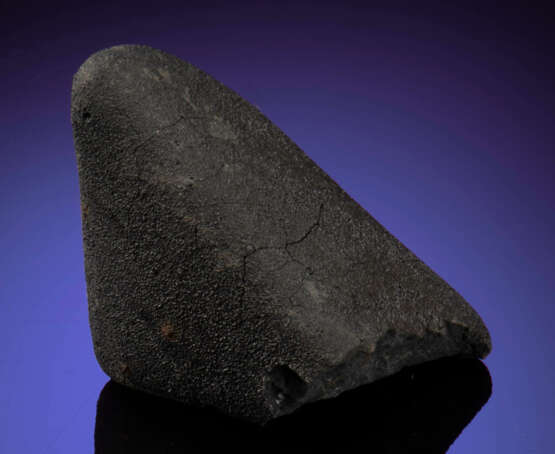ID 716439
Lot 54 | WINCHCOMBE METEORITE — THE LEFTOVER INGREDIENTS OF THE RECIPE OF LIFE
Valeur estimée
$ 35 000 – 70 000
"A bright fireball was observed blazing across the sky, travelling from approximately W to E over the United Kingdom at 21:54 (UT) on 28 February 2021. The fireball was recorded by 14 stations operated by the six meteor camera networks comprising the UK Fireball Alliance. It was also caught on numerous dashboard and doorbell cameras. There were over 1000 eyewitness accounts from across the entire UK, as well as Ireland and northern Europe, with reports of a sonic boom in the local area. The following morning, the Wilcock family discovered a pile of dark stones and powder on their driveway in the town of Winchcombe, Gloucestershire. Material from the impact site was collected into plastic bags that morning."
The Bulletin goes on to describe who found what in the ensuing days, and the name that comes up most often is that of Chris Casey, an intrepid meteorite hunter who found multiple specimens over the course of a week. In total, only 602 grams of Winchcombe was ever found — and 90% of this material is controlled by The Natural History Museum. Now offered in this sale are two of the specimens recovered by Mr. Casey himself.
Winchcombe is a CM2 (Carbonaceous chondrite of the Mighei group best described as having small chondrules, CAIs and hydrated minerals in a fine grained carbon-rich, charcoal-hued matrix.) Many CM2s are also rich in prebiotic compounds and amino acids. Both Murchison and Cold Bokkeveld (see lots 26 and 31) are CM2s.
Stated Dr. Mark Sephton, an astrobiologist at London’s Imperial College, "The organic molecules in the [sample of Winchecombe] are older than the Earth itself, and similar molecules would have rained down on the early Earth before life emerged. They may represent the first chemical steps towards life in the early solar system, and could be the leftover ingredients from the recipe of life."
Indeed, like many CM2 meteorites, the presence of organic compounds has been detected in Winchcombe by the sense of smell, where at least one stone was described as having a 'compost-like' aroma.
As if Winchcombe wasn’t special enough, as a result of all of the camera angles of its descent, Winchcombe’s orbit around the sun has been precisely determined. Moreover, it evidences alteration from extraterrestrial water. Winchcombe is a breccia that contains both CM2 and CM1 lithologies — and CM1 meteorites are, apart from being the rarest variety known, among the most water-rich; they contain secondary minerals which only could have formed as a result of aqueous alteration. Like other CM2 meteorites (see lot 46), Winchcombe contains CAIs (calcium aluminum inclusions), the first materials to have formed in the solar nebula from which our solar system was created. CAIs are the oldest matter humankind can see and touch.
Perhaps the advent of Winchcombe can best be summed up by a quote in a National Geographic piece this past March. Said the typically composed cosmochemist, Professor Sara Russell, a renowned meteorite scholar and Lead Researcher at the Planetary Materials Group at the Natural History Museum in London, "We’ve all just gone bananas!"
This offering and that of lot 1 will be among the only opportunities to acquire a specimen of the Winchcombe meteorite that are larger than a speck.
Christie's would like to thank Dr. Alan E. Rubin at the Department of Earth, Planetary, and Space Sciences, University of California, Los Angeles for his assistance in preparing this catalogue.
39 x 27 x 24mm (1.5 x 1 x 1in.) and 15.08g (75 carats)
| Adresse de l'enchère |
CHRISTIE'S 8 King Street, St. James's SW1Y 6QT London Royaume-Uni | |
|---|---|---|
| Aperçu |
| |
| Téléphone | +44 (0)20 7839 9060 | |
| Commission | see on Website | |
| Conditions d'utilisation | Conditions d'utilisation |




